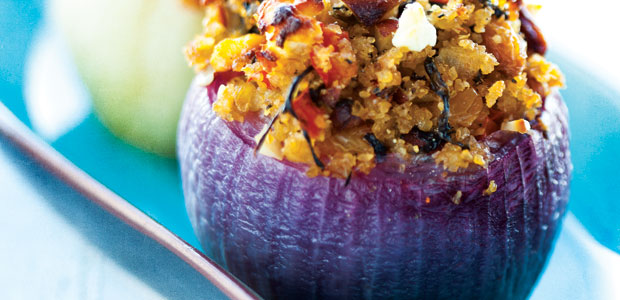Advertisement
Onions, Garlic, and Leeks!
The many tasty benefits of alliums

Think of your favourite savoury recipes. You would probably be hard-pressed to choose one that does not start by sautéing onions or garlic, or both.
Onions and garlic belong to the Allium genus, in the same plant family as the lily. With approximately 750 distinctive species grown worldwide, the allium vegetables include not only onions and garlic, but also leeks, chives, scallions, and shallots.
There are many different varieties of each allium vegetable. Each has its own unique flavour, which can range from very strong to mild and sweet. Alliums are not only delicious, but they’re also chock full of disease-fighting, health-promoting properties.
Alliums with a more pungent flavour may contain a greater percentage of health-enhancing compounds. Full of antioxidants, alliums have been shown to have antibacterial, antiviral, anti-inflammatory, and prebiotic properties. As well, alliums help to regulate blood pressure, lower cholesterol, and decrease the likelihood of developing blood clots.
Research has shown that alliums contain a large number of compounds that may defend against certain diseases. A rich source of flavonoids, alliums protect against cardiovascular disease, and provide a host of substances that have been shown to protect against cancers, particularly those of the stomach and colon.
There’s no denying that alliums have everything going for them! Take inspiration from the following recipes. Introducing alliums to your menus will ensure that your family enjoys the many healthy and delicious benefits of these amazing vegetables.
No more tears
When it comes to cutting onions, many people get teary-eyed. This reaction is due to sulphur compounds in the vegetables reacting with other elements to create an irritating gas when the vegetable is cut. Generally the sweeter the onion, the less likely it is to make you teary, as it contains less of the enzymes that turn the sulphur into a gas. Onions harvested in the spring and summer have a higher water content and are often less strong and tart than those harvested in the fall. While we can’t stop this chemical reaction, there are a few methods you can try to stay dry-eyed.
- Freeze onions for 20 minutes before chopping.
- Use a sharp knife when cutting onions, as this will do less damage to the onion cells, thereby causing fewer eye-irritating elements to be released.
- Create a breeze with a fan, or chop under the hood fan of your stove. This will draw the gas away from your eyes.
- Cut the onion in half and rinse well under cold water for a minute or two before chopping. This should wash away the released elements that cause irritation.
Breathe easy
Sulphuric compounds in alliums are what gives them their piquant flavour and causes bad breath. To ward off bad breath after enjoying a dish heavy in garlic or onions, consider chewing on some parsley, mushrooms, spinach, or basil; snacking on a kiwi fruit; or drinking a glass of milk.
Odour eater
When working with garlic or onions you may find that you can smell them on your hands for hours afterward. One of the easiest ways to remove this smell is to rub your hands on a stainless steel utensil while rinsing hands under water. You can also rub your hands with a squeeze of lemon, a good pinch of salt, a little baking soda, or some toothpaste, and then rinse with water.
Recipes





